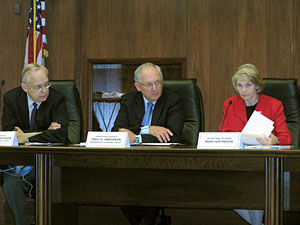Audio
Photos
Your Voice
| ||||||||||||||||||||||||||||||||||||||||||||
Independence Party turns to Supreme Court to get ballot access
September 21, 2004
The Independence Party on Tuesday asked the Minnesota Supreme Court to allow its candidates to remain on the November ballot. Secretary of State Mary Kiffmeyer determined last week that none of the party's 26 candidates for Congress and the Legislature met a necessary statutory threshold in last week's primary for staying on the ballot. Independence Party officials say Kiffmeyer is deliberately trying to keep their candidates off the ballot, a charge Kiffmeyer denies.
St. Paul, Minn. — A decades-old provision in state election law says at least one candidate from a party must get 10 percent of the votes cast in the last statewide election. Otherwise, all candidates from that party have to collect signatures to stay on the ballot. But the provision appears to be a catch-22, because the deadline for collecting signatures came a couple of months, before the state's primary.
Independence Party chairman Jim Moore says the law places an unfair burden on candidates, and the secretary of state isn't giving the party's candidates any remedy. He also says Kiffmeyer should have told candidates about this law.
 | |||
"We did not know about this law, and yes, we would have notified our candidates and in fact, to the t, I think every single one of my candidates has expressed, my God, if I would have known about this, we really could have got enough people out to do this. Again, all of my state House candidates were unopposed," Moore says.
Independence Party officials say Kiffmeyer did not apply this particular law in the 2000 election. They say if she had, none of the party's candidates would have met the 10-percent threshold that year either.
Kiffmeyer acknowledges her office hasn't used this law to remove names from the ballot in the past. She says a new computer system allowed her office to quickly run election results after the primary, and calculate that the Independence Party hadn't met the threshold. Kiffmeyer says she disagrees with the law, but says it's her job to administer state election law. She says the law is not obscure, and candidates should have known about it.
"This is not like it's tucked away somewhere under business services. This is right front and center with political parties, with the major political parties, right exactly where it should be, nothing difficult to find, and just like in any other area, they have a responsibility to read that, to know that," she said.
Kiffmeyer says the law also requires her to immediately certify candidates' names for the ballot, once the state canvassing board has certified the primary results. She says she will do that quickly so that counties can start printing ballots, unless a court instructs her otherwise.
|
I think they're stealing our democracy right out from under us.
- Brian Balfanz, legislative candidate from Maplewood |
Attorney General Mike Hatch says he expects the Supreme Court to take up the matter by the end of the week. Hatch says as the state's top lawyer, he will defend the law before the Supreme Court. But Hatch says if the judges ask him, he will say he has grave concerns about the fairness of the law.
"I don't think it's an appropriate role for the attorney general, at least in this type of an instance, to simply say that a statute's unconstitutional. But I do think it's appropriate for me to say I see no rational basis for it under the 14th Amendment," according to Hatch.
The Independence Party also argues that the law was repealed in 1996, but Hatch disagrees; he says it was amended just last year.
State Sen. John Marty, a DFLer from Roseville, says he sponsored the 1996 bill that attempted to repeal the 10-percent requirement. But the repeal language was apparently nullified by a U.S. Supreme Court ruling. Marty says the law may have made sense decades ago, when the state needed to set a standard for who could run for office.
"Since that time, there have been all sorts of other standards put in place determining what a major party is, what a minor party is, and what it takes to qualify to be on the ballot. And those laws superseded the need for this one. So it was an outdated law, an obsolete law that I think should have been repealed," Marty says.
 | |||
Marty says he will try to repeal it next session. But that doesn't help the Independence Party candidates this election. The candidate who came closest to reaching the 10-percent threshold was Brian Balfanz of Maplewood. Balfanz got 101 votes in the primary, just 17 votes shy of the needed 118.
"I think to some extent what's most disappointing is of the 101 who voted for me, they might not have a chance to vote for me on November 2. I think they're stealing our democracy right out from under us," Balfanz says.
Balfanz says he didn't do a get-out-the-vote effort before the primary; he says he was saving his resources for closer to the general election. He says he hopes "moderation and smarter thinking" will prevail.
|
News Headlines
|
Related Subjects
|


